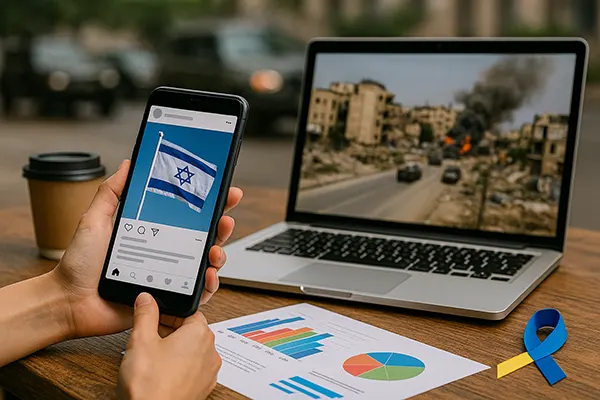
“Israeli-Style Marketing”: How Brands Operate in Real-Time During Crises and Wars
When the world shakes, marketers can’t afford to wait. In the shadow of ongoing global conflicts — from Ukraine to the Middle East — companies are adapting their strategies to reflect the Israeli-style approach: real-time responsiveness, emotional precision, and extreme agility. As seen in Israel, brands are no longer just observers but active participants in the national and emotional narrative during wartime. This article explores how such a model can become a blueprint for modern marketing across volatile regions.
Real-Time Marketing as a Survival Strategy
In Israel, brands have long mastered the art of real-time marketing (RTM) because crisis is not an exception — it is a constant. Companies act immediately, not just to capture attention, but to reflect solidarity, resilience, and local relevance. When rockets fly or sirens blare, campaigns pause within minutes. Pre-scheduled ads are pulled, and real-time messages of support, utility, or silence take their place.
This reflexive agility is enabled by streamlined internal processes. Marketing teams are embedded within crisis command structures, with PR, legal, and creative working in unison. Approval cycles are drastically shortened, sometimes allowing for content to go live within an hour of an event. This operational model, forged in adversity, is being studied globally as marketers realise the cost of delay.
Social media, in particular, becomes the front line. Brands like McDonald’s Israel or Cellcom frequently shift tone and messaging depending on breaking news. During wartime, posts are repurposed to deliver safety instructions, emotional messages of unity, or simply pause regular communication out of respect. It’s a delicate balance between presence and restraint — and Israeli marketers walk that line daily.
Examples of Effective Response Models
One standout example is how Bank Hapoalim quickly shifted to offer financial relief content across all digital platforms following missile attacks. They paused standard campaigns and launched explainer videos on emergency loans, with real-time updates embedded into their mobile banking app.
Similarly, telecom provider Partner launched free internet packages for families in conflict zones within 24 hours of hostilities erupting. The initiative was communicated not through loud PR but via subtle in-app notifications and low-profile posts, reinforcing authenticity.
Another notable case: Israeli food delivery brand 10Bis used their data to reroute couriers away from high-risk areas and then shared this story through Instagram with a campaign titled “Safety First.” Engagement was high not for promotional reasons but due to its ethical foundation.
The Psychology of Consumers During Wartime
During war, consumer behaviour changes drastically. In Israel, marketers have identified that in times of conflict, emotions overtake logic. Trust, familiarity, and emotional safety become the strongest decision drivers — much more than price or novelty. Brands that understand this human layer earn lasting loyalty.
Israeli consumers tend to prefer brands that “stand with them” — those who speak their language, share their fears, and do not exploit crisis. In surveys from Tel Aviv University in 2024, over 70% of respondents said they would switch brands based on wartime response alone. Emotional intelligence thus becomes a business-critical metric.
Moreover, humour — carefully and sparingly used — plays a unique role. In a region used to existential stress, brands like Bamba or Goldstar sometimes post satirical content that reflects collective sentiment, often with disclaimers. When done well, it humanises the brand and generates profound emotional engagement.
Emotional Messaging and Brand Loyalty
Brands in Israel adopt tone segmentation in wartime. While B2C communication leans toward comfort, utility, and empathy, B2B messaging shifts to stability, partnership, and security. Context defines voice — and any misstep can mean public backlash.
Tonal shifts aren’t random; they’re rooted in years of consumer psychology data and crisis-era A/B testing. For example, emotionally neutral posts during air-raid escalations saw 40% less engagement than those expressing solidarity. Israeli marketers track such micro-metrics obsessively.
Crucially, these emotional strategies are not reserved for giants. Small businesses in Israel use Facebook Stories and WhatsApp Business with hyper-local updates, often including personal messages from the founder — a humanised touch that enhances trust.

Adapting Messaging to the News Cycle
Perhaps the most nuanced component of Israeli-style marketing is message agility — not just changing the message, but adapting it to echo the exact emotional frequency of the national mood. News dictates everything: from tone to channel to timing. This reactive model requires a newsroom-like rhythm within marketing teams.
Daily war briefings aren’t just for citizens — they’re for marketers, too. Teams gather each morning to align with the latest developments, set tone-of-day guidance, and revise content calendars. This enables brands to speak precisely — neither too soon, nor too late.
Importantly, this doesn’t mean over-communication. Israeli brands often adopt “strategic silence” — choosing not to post unless they have value to offer. In times of tragedy, this restraint earns respect. Value-driven speech replaces volume-driven noise.
Channels and Formats that Support Flexibility
Instant messaging platforms like Telegram and WhatsApp have become core channels for crisis-adaptive communication. Unlike traditional social media, they allow for segmented, fast, and private outreach — perfect for localised updates or customer support in real-time.
Push notifications are another powerful format. From banks to grocery chains, brands use app alerts not for marketing fluff but for alerts on store hours, delivery changes, or financial aid. It keeps customers informed and connected without being intrusive.
Video is also king — but with a twist. User-generated or lo-fi video often outperforms glossy content. It feels more real. Brands such as Super-Pharm use frontline videos from employees volunteering with medical units — combining transparency with purpose, and building community trust.
Similar news
-
 Clone Landing Pages and Domain Spoofing: How Br...
Clone Landing Pages and Domain Spoofing: How Br...Clone landing pages and lookalike domains remain one of the …
-
 “Negative PR as a service”: what commercial sme...
“Negative PR as a service”: what commercial sme...The phrase “negative PR as a service” is used for …
-
 How Fake Review Networks Operate in 2026: Real ...
How Fake Review Networks Operate in 2026: Real ...Fake review networks have moved far beyond “a few paid …
